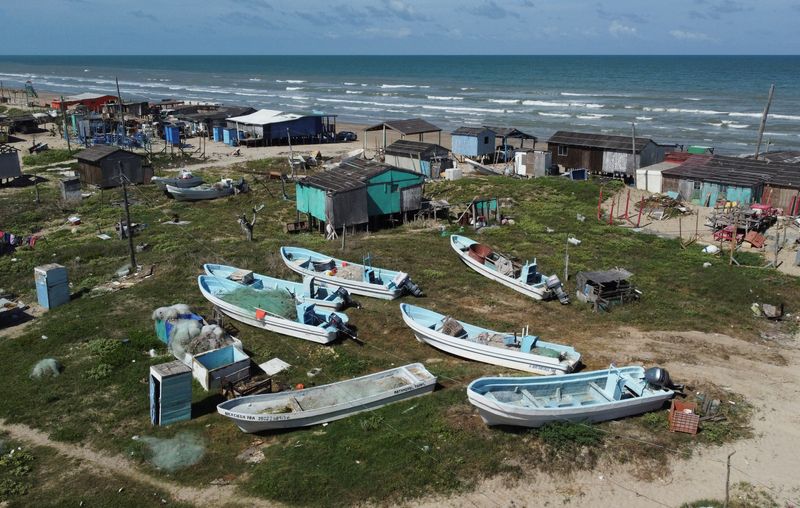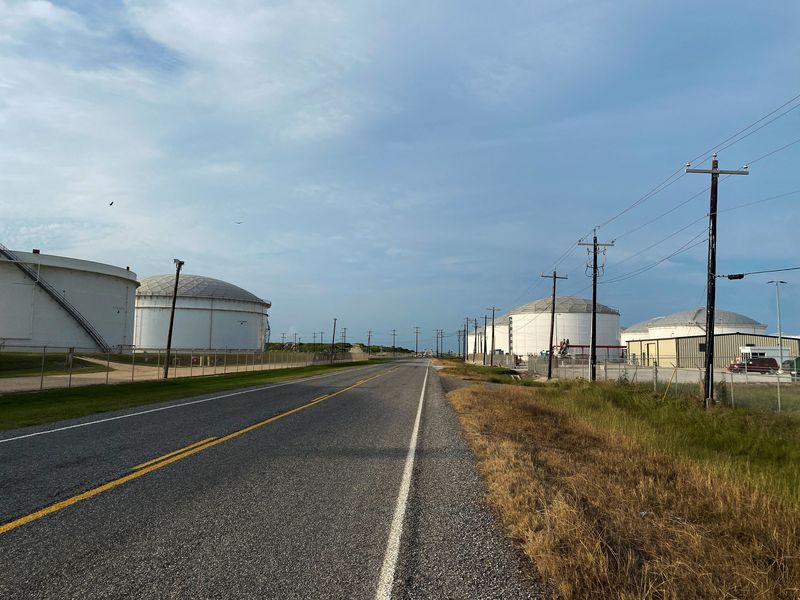
By Arathy Somasekhar, Marianna Parraga and Erwin Seba
HOUSTON (Reuters) -The largest ports in Texas closed operations and vessel traffic on Sunday to prepare for Tropical Storm Beryl, which was expected to strengthen back to a hurricane before hitting the area early on Monday.
The storm, which at one point intensified to a Category 5 hurricane, left a deadly trail of destruction across the Caribbean. It could grow into a Category 2 hurricane after making landfall in the middle of the Texas coast between Galveston and Corpus Christi.
The ports of Corpus Christi, Houston, Galveston, Freeport and Texas City said they closed after condition “Zulu” was set by Coast Guard captains on Sunday. All vessel movement and cargo operations are restricted as gale force winds are expected within 12 hours.
Corpus Christi, about 200 miles (322 km) from Houston, is the top crude oil export hub in the United States. Texas City, and Freeport also are major oil and refined products shipping hubs on the U.S. Gulf Coast.
Port closures could bring a temporary halt to crude exports, oil shipments to refineries, and motor fuels from those plants.
The 52-mile Houston ship channel, which on Sunday operated under transit restrictions before halting all traffic, allows access to 8 public facilities and some 200 private terminals.
The U.S. National Hurricane Center modified Beryl’s expected path, marking a northerly turn with a forecast landfall near Matagorda Bay. The storm could bring 85 mph (136 kph) winds and cause major flooding, including in suburbs around Houston.
Almost 14,000 customers in Texas had lost electricity on Sunday evening, according to PowerOutage.us. Power provider Centerpoint Energy (NYSE:CNP) said it was monitoring the storm and making preparations.
Acting Texas Governor Dan Patrick urged people who were on vacation in coastal areas to leave before the storm arrival.
“It’s a serious storm and you must take it seriously and be prepared,” he said in a meeting with officials in Austin.
PREPARED
Energy infrastructure company Kinder Morgan (NYSE:KMI) said on Sunday it shut its West Clear Lake and Dayton natural gas storage facilities, and its Texas City natural gas processing facility ahead of the storm.
“We expect this to have minimal impact on our pipeline operations,” it said. All the company’s other facilities in the storm’s path remain operational.
Some energy facilities in Texas had to shut or slow down operations because of wind storms linked to Beryl.
Freeport LNG’s liquefaction trains 1, 2 and 3 and a pre-treatment facility were proactively shutdown due to impacts associated with Beryl. Plant operators later restarted them “as efficiently as possible to minimize flaring,” according to a filing with The Texas Commission on Environmental Quality.
Freeport said on Sunday that it had ramped down production at its liquefaction facility and intends to resume operations once it is safe to do so after the weather event.
Liquefied natural gas producer Cheniere Energy (NYSE:LNG) said on Sunday its Corpus Christi facility was operating without interruptions, but all nonessential personnel were released.
“Our Gulf Coast assets have robust and proven severe-weather preparedness,” it said in a release.
Chemical maker Chemours Co , which has a production facility near Corpus Christi, said on Sunday it escalated its hurricane preparedness plans “to include planning for safe and adequate staffing during and after the storm and securing equipment and assets, should the storm make landfall near our site.”
Enbridge (NYSE:ENB) Inc, which operates large crude export facilities near Corpus Christi, said all U.S. Gulf assets were operational, adding that they had activated emergency plans.
Gibson Energy (TSX:GEI), which also operates an export facility in the area, said on Sunday all Gateway and Houston based employees were safe, and facilities and docks were secured after the port of Corpus Christi closure.

Citgo Petroleum Corp was cutting production at its 165,000 barrel-per-day Corpus Christi refinery on Saturday, sources said. The refiner plans to keep the plant in operation at minimum during Beryl’s passage.
Some oil producers, including Shell (LON:SHEL) and Chevron (NYSE:CVX), had also shut in production or evacuated personnel from their Gulf of Mexico offshore platforms.
This post is originally published on INVESTING.


